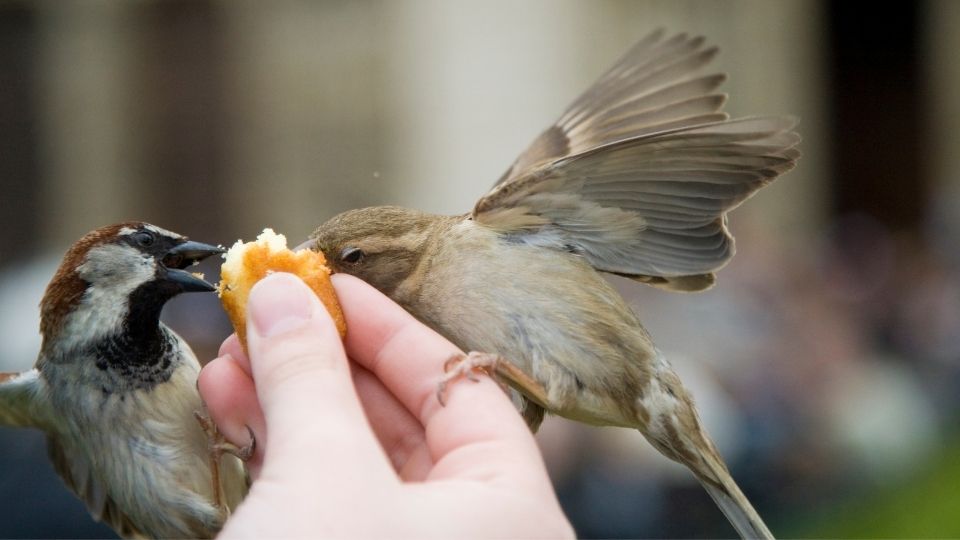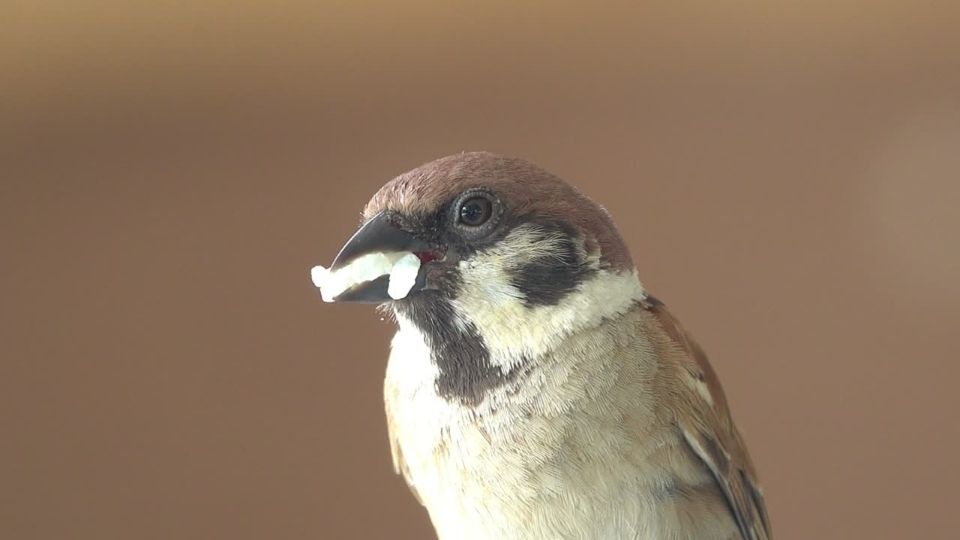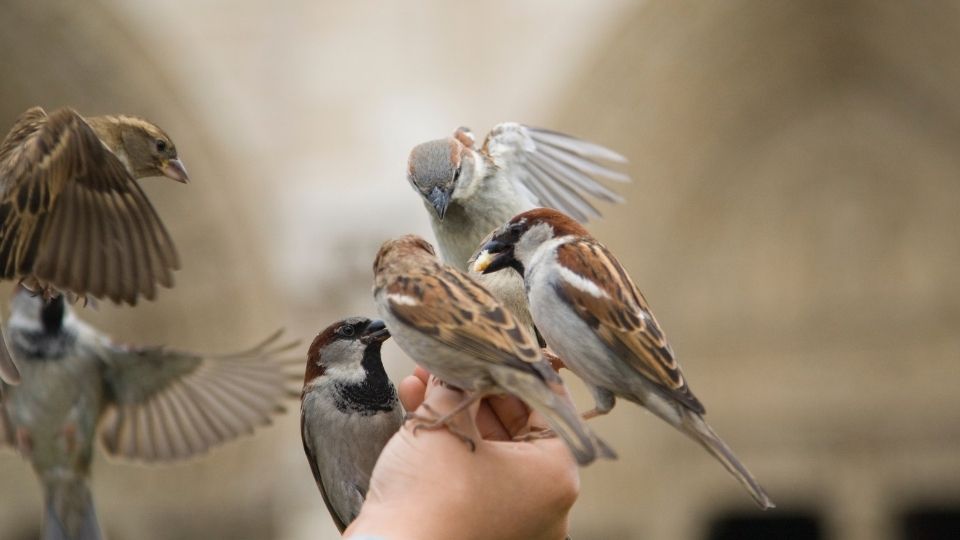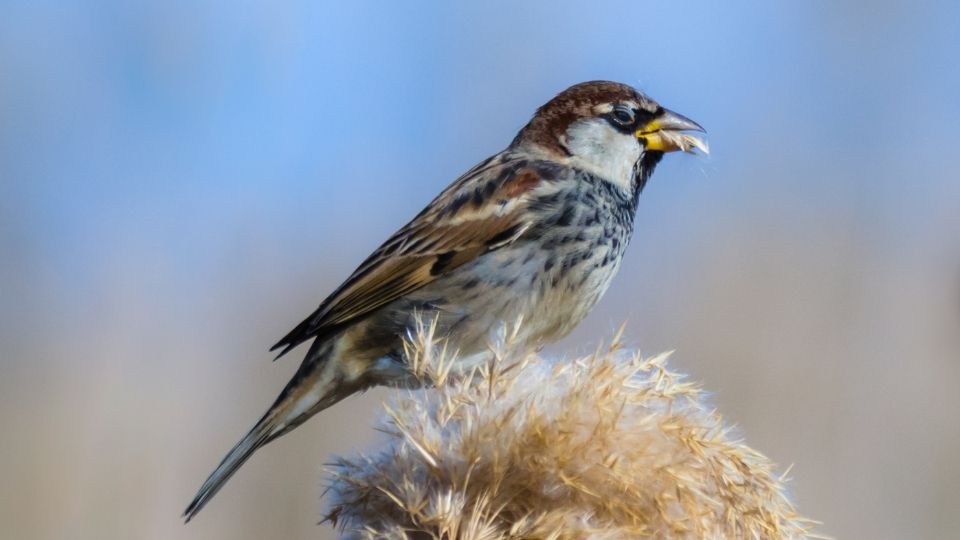What do Sparrows eat?
House sparrows are relatively easy to feed, and they like a variety of plant matter. Sparrows mainly feed on grains, including soybeans, rice, white millet, red millet, wheat, oats, barley, cracked corn, and sorghum.
They also like birdseed and most nuts.
They have small beaks and prefer food that is no larger than a medium cracked kernel of corn.
Sparrows have adapted to urban life since they were introduced to North America. They are no-native birds who compete with other songbirds for food and will eat almost anything.
In fact, one of the few foods they don’t like is the black oil sunflower seeds.
If you’re trying to prevent these little birds from eating bird food meant for other songbirds, adding black oil sunflower seeds will do the trick!
Just make sure you provide the sparrows with their own bird feeder filled with their favorite foods.
If you want to feed your own house sparrows and keep them coming back for more, you can feed them grains from your kitchen!

What is the typical diet of a sparrow?
House sparrows are far from fussy eaters. Of all the songbirds, the sparrow diet is one of the most varied and easily accommodated. It’s almost easier to list the foods they won’t eat instead of the foods they will.
In the wild, sparrows eat ragweed, buckwheat, crabgrass, and other grasses. They are ground forages and most everything they enjoy eating can be found between one and five feet from the ground.
House Sparrows will happily eat commercial birdseed including millet, milo, and sunflower seeds. Place bird feeders on the near the ground and no higher than five feet.
Since they are ground foragers, bird feeder perches need to be at least 5/8” long so they can hold themselves easily while eating from your bird feeder.
House sparrows always enjoy insects, which they will take to feed baby sparrows.

What are sparrow’s favorite foods?
House sparrows have changed their eating habits drastically since learning to live close to people. While wild birds still favor grasses and wheat, sparrows will also eat anything that’s plant based if it’s small enough.
Adult sparrows like scraps and have been known to scavenge human food left behind. If you have sparrows in your backyard, discarded pieces of vegetables in small pieces such as parsley, peas, and carrots will be devoured by house sparrows in no time.
If you’re feeding your sparrows, stick to bird food that contains millet, wheat, and cracked corn as your base. You can still offer them scraps, but their main food source should be bird food created just for their dietary needs.
This food is made with the right balance of vitamins and minerals to help your garden sparrows thrive.

Can sparrows eat meat?
Sparrows are technically omnivores, which means they eat both plants and meat. While sparrows technically can eat meat if the pieces are small enough (like diced wet cat food) when they eat meat, sparrows primarily eat moths and other insects.
Like many omnivores, sparrows are opportunistic hunters when it comes to insects. Anything with a soft body is fair game. Insects such as spiders, mealworms and caterpillars are fair game, and sparrows are excellent hunters.
When food is scarce, soaked dog food or cat food can be offered to sparrows in a pinch. They also enjoy store bought meal worms.
If you happen to have young tomato horn worms plaguing your garden, sparrows will readily eat those as well, though only when they are quite small.
House sparrows also love aphids, crickets and earthworms.
What do sparrows eat in the winter?
Sparrows can be aggressive and are known to steal food from songbird feeders, even when it’s not their ideal food. The only food they actively shun is black oil sunflower seeds.
During the winter when food is scarce, sparrows can be extra aggressive and run off other songbirds. If you’re feeding multiple bird species, make sure the sparrows have their own feeder with all their favorite foods. As long as sparrows are well-fed, they will happily leave other songbirds alone.
When food is hard to come by, sparrows are known to eat discarded human food. You’ve probably seen them in amusement parks and outdoor restaurants, swooping in to steal whatever strikes their fancy.
These small birds even steal livestock feed when they can!
If food is especially scarce and you’re worried about your house sparrows, you can offer them a variety of human food.
Sparrows can eat peas and corn, leftover baked potatoes, or even vegetables from canned soups.
When it comes to feeding birds, sparrows are one of the easiest. If they know food is readily available year-round, they will return often.

What is the best feed for sparrows?
While sparrows aren’t the pickiest eaters, it’s important for them to have a well-balanced food source. This ensures their health and long life, as well as the health of nestlings they may be feeding.
House Sparrows eat mostly grains and seeds, so any diet with those as the main ingredient will work well. You can create your own sparrow bird food using rice, white millet, red millet, wheat, oats, barley, cracked corn, and sorghum.
Mixing in fruits and nuts is an excellent way to add variety and flavor to the house sparrow food.
The occasional dried mealworm is a welcome treat. Dried mealworms sold for reptiles or chickens are both safe to use for your sparrows.
If you’re unsure if you have the right balance of feed for your house sparrows, there are many commercially available bird feeds specifically for sparrows. You don’t need to worry about food for baby birds, since the adult sparrows will bring food to their nesting sites regularly.
Whatever you choose to do, remember, sparrows are not picky and anything you offer them from their list of foods will be well-received.
Sparrows have evolved to live near humans because they enjoy being fed. And a flock of well-fed sparrows will happily return year after year.

